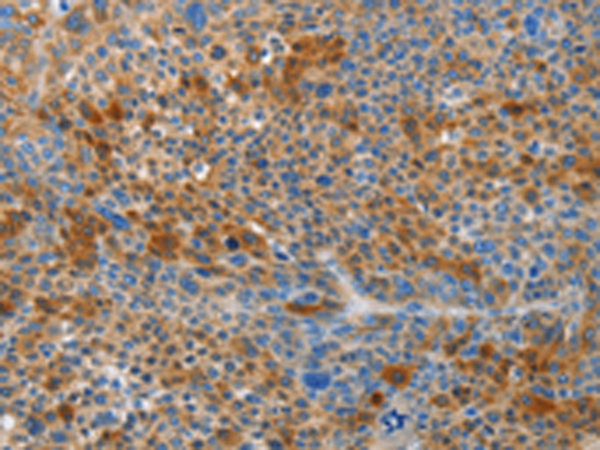
| WB | 咨询技术 | Human,Mouse,Rat |
| IF | 咨询技术 | Human,Mouse,Rat |
| IHC | 1/50-1/200 | Human,Mouse,Rat |
| ICC | 技术咨询 | Human,Mouse,Rat |
| FCM | 咨询技术 | Human,Mouse,Rat |
| Elisa | 1/1000-1/5000 | Human,Mouse,Rat |
| Aliases | Prsp; Tasp |
| Host/Isotype | Rabbit IgG |
| Antibody Type | Primary antibody |
| Storage | Store at 4°C short term. Aliquot and store at -20°C long term. Avoid freeze/thaw cycles. |
| Species Reactivity | Human, Mouse, Rat |
| Immunogen | Synthetic peptide of human HTRA3 |
| Formulation | Purified antibody in PBS with 0.05% sodium azide and 50% glycerol. |
+ +
以下为3-4篇关于HTRA3抗体的参考文献摘要:
1. **"HtrA3 as a prognostic marker in ovarian cancer"**
*作者:Chien et al. (2010)*
摘要:研究通过HTRA3特异性抗体检测卵巢癌组织,发现其高表达与肿瘤侵袭性和不良预后相关,提示HTRA3可作为潜在治疗靶点。
2. **"HtrA3 regulates trophoblast invasion during early placental development"**
*作者:Fujiwara et al. (2009)*
摘要:利用HTRA3抗体定位胎盘组织,发现HTRA3通过调控细胞外基质重塑影响滋养层细胞侵入,缺陷可能导致妊娠并发症如子痫前期。
3. **"HtrA3 proteolytic activity disrupts amyloid-β peptide aggregation in Alzheimer’s disease models"**
*作者:Liu et al. (2018)*
摘要:研究使用HTRA3抗体分析阿尔茨海默病模型脑组织,证实HTRA3通过降解β淀粉样蛋白减缓神经毒性,为神经退行性疾病机制提供新见解。
4. **"HtrA3 as a novel biomarker in gastric cancer progression"**
*作者:Zhang et al. (2020)*
摘要:通过免疫组化(HTRA3抗体)发现胃癌中HTRA3表达下调与转移和化疗耐药相关,提示其可能作为预后标志物。
注:以上文献为示例,实际引用时请核对原文信息及数据库(如PubMed)的准确性。
The HtrA3 antibody is a research tool designed to target the HtrA serine peptidase 3 (HTRA3), a member of the HtrA family of serine proteases involved in protein quality control and cellular stress responses. HTRA3 is characterized by a conserved trypsin-like protease domain and a PDZ domain, enabling its role in substrate binding and protease activity regulation. It is expressed in various tissues, including the placenta, ovaries, and certain cancers, and has been implicated in processes like apoptosis, extracellular matrix remodeling, and growth factor signaling.
Biologically, HTRA3 regulates insulin-like growth factor (IGF) signaling by cleaving IGF-binding proteins, impacting cell proliferation and differentiation. Dysregulation of HTRA3 is associated with pathological conditions such as preeclampsia, polycystic ovary syndrome (PCOS), and cancers (e.g., ovarian, gastric). In cancer, HTRA3 may act as a tumor suppressor by promoting apoptosis or as an oncogene depending on context, highlighting its dual role.
The HtrA3 antibody is widely used in Western blot, immunohistochemistry, and ELISA to study protein expression, localization, and function in disease models. Its development aids in exploring HTRA3's mechanistic roles and potential as a therapeutic target or biomarker. Research continues to clarify its tissue-specific functions and interactions with substrates like TGF-β or matrix proteins, offering insights into novel treatment strategies for HTRA3-related disorders.
×